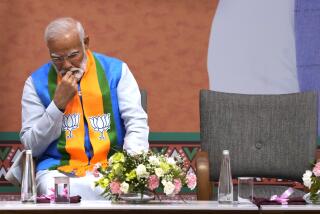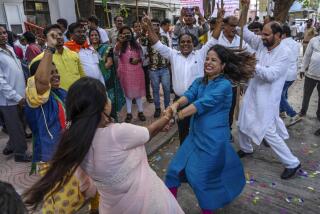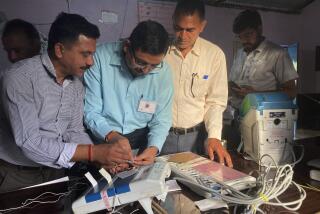Congress Party Seeks a Prime Minister : India: The election produced no clear winner, and the party will have to rule with a minority government.
- Share via
NEW DELHI — New members of India’s Parliament flooded into the capital Wednesday, humbled by final election results that punished all major political parties by denying any of them a majority victory, while the leaders of slain former Prime Minister Rajiv Gandhi’s Congress-I Party spent their third straight day behind closed doors, heading for a showdown today in their choice of the nation’s next prime minister.
The Congress-I emerged from the elections--the deadliest and most traumatic in India’s history--as the single largest party, winning just over 220 of the 511 seats at stake in the national Parliament, according to final results announced early today. The results included all but a handful of the most remote electoral districts.
But for the second time in 18 months, no clear winner emerged. And the century-old party that ruled India for all but 4 1/2 of its 44 years since independence reconciled itself Wednesday to running the vast nation of 844 million with a minority government for the first time.
None of India’s three other major political forces were willing to join the Congress-I in a coalition, and they were also unwilling to force another potentially brutal election on the nation. The voting for Parliament left more than 300 voters and candidates slain, cost tens of millions of dollars to stage and robbed India of its most dynamic potential prime minister.
With his options thus limited, President Ramaswami Venkataraman is expected to accept Congress-I’s choice for prime minister today and to officially constitute the new Parliament.
The party’s finalists for the top job narrowed to two Wednesday, neither of them elected to national office during the recent voting.
The leading candidate is P. V. Narasimha Rao, a 70-year-old veteran lawmaker who stayed out of this year’s elections because of age and failing health. He was named interim party leader last month to end the infighting that erupted when Gandhi’s widow, Sonia, rejected the post in the days after her husband was assassinated May 21 by a suicide bomber at an election rally. Now, the leadership of the traditionally dynastic party of Gandhi’s mother and grandfather is said to be favoring Rao as a compromise prime minister who is experienced and loyal enough to balance the many forces within the party and in its now-powerful opposition.
The other candidate is Sharad Pawar, regional boss of Bombay’s state of Maharashtra, who led the Congress-I to its near-sweep of the state’s parliamentary seats and commands the support of many of the party’s other young, regional leaders.
Pawar has been lobbying the party’s inner circle to depart from its traditional method of choosing its leader by “consensus”--back-room selection by a non-elected inner-party cadre of Gandhi loyalists known as the “coterie.” The choice is then rubber-stamped in a session of the party’s elected members. On Tuesday, Pawar’s proposal that the elected members choose their next leader by secret ballot won the support of 40 newly elected lawmakers, who signed a document urging the elitist leadership to adopt a more democratic method of selection.
Most analysts said the secret ballot would favor Pawar, a free-thinking capitalist who has made little secret of his national ambitions. But in an interview Wednesday, Rao, who was a close friend of Gandhi and his mother, Indira, and a member of the party’s coterie, said he is confident that the leadership battle will be settled by consensus during a party meeting now scheduled for today.
Indeed, it was Rao’s comfortable, South Delhi manor that has been the hub of political activity during the three days that India’s election commission laboriously tallied the hundreds of millions of votes cast in 22 states that range from rugged mountains and deserts to monsoon-swollen swamps.
Among the minions who called on Rao on Wednesday were party bosses from all corners of the country, and the aging leader said he received a stream of endorsements for the consensus method.
Meanwhile, at a meeting Wednesday night, another party--representing what has emerged as the most powerful force in Indian politics--was mapping out its future strategy.
The Hindu-revivalist Bharatiya Janata Party, which not only won more than 110 parliamentary seats in the final tally but also secured a firm majority in the assembly of Uttar Pradesh, India’s most populous state, was hardly as equivocal as the Congress-I in its post-election decisions.
“We will sit in the opposition,” declared Lal Krishna Advani, the charismatic and grandfatherly leader of the BJP, or Indian People’s Party.
Advani led the party’s electoral crusade to build a temple to Hinduism’s demigod Lord Rama on the site of an ancient mosque in Uttar Pradesh as an ultranationalist symbol for Hindu-dominated India. The party’s clear victory in that state has planted the seeds for a bitter confrontation with the Congress-I, which campaigned on a secular platform.
More to Read
Sign up for Essential California
The most important California stories and recommendations in your inbox every morning.
You may occasionally receive promotional content from the Los Angeles Times.












